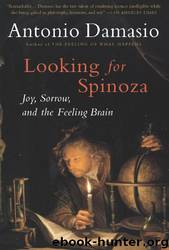Looking for Spinoza: Joy, Sorrow, and the Feeling Brain by Antonio Damasio

Author:Antonio Damasio [Damasio, Antonio]
Language: eng
Format: epub
Publisher: Houghton Mifflin Harcourt
Published: 2003-12-01T07:00:00+00:00
The Hague, December 2, 1999
The annual Huygens Lecture is named after Christiaan Huygens. Huygens had little to do with brain or mind or philosophy and everything to do with astronomy and physics. He cared for space:
He discovered Saturn's rings and estimated the distance between the earth and the stars by pin-holing the sun. He cared for time: He invented the pendulum clock. And he cared for light: The Huygens principle refers to his wave theory of light. As the most famous scientist in Holland's history, he is the patron saint of this annual lecture, which is meant to feature any field of science. By the way, in his time Huygen's father, Constantijn, was as famous as the son and no less remarkable. His knowledge spanned Latin, music, mathematics, literature, history, and the law. He was a well-rounded art connoisseur. He was a poet. He was a statesman—a secretary to Holland's stadtholder, as his own father had been. The pressing task of filling the palaces of the state with suitable paintings also made him a patron of the arts. His great discovery: Rembrandt.
The subject of my lecture is the neural basis of the conscious mind, and given the drift of my thoughts over the past year, the connection to Huygens turns out to be quite appropriate. Huygens and Spinoza were contemporaries. They were born not quite three years apart and were even neighbors for a time. Of course, Huygens lived in splendor, not in a rented apartment—the Huygens family had a palace in The Hague and a large estate between The Hague and Voorburg. But they did breathe the same air and saw each other on several occasions. Huygens acquired lenses from Spinoza and wrote to him from time to time with questions about philosophical issues. Spinoza was well acquainted with Huygens's work and owned copies of his books. At least three letters from Spinoza to Huygens survive, dated 1666, replying to Huygens's questions on the unity of God. They are addressed "Distinguished Sir," and behind the matter-of-fact tone one senses more than an arm's length. Spinoza goes straight to the point, wasting no time with ceremonial niceties. The worlds of the now outcast Dutch-Jew and the established Dutch aristocrat might have been bridged by their intellectual curiosity, but their personalities seem to have been too different for any friendship to be possible. Nonetheless, they knew where each other stood. Huygens knew that Spinoza had little patience for Huygens's sometime teacher, René Descartes—Descartes had initiated young Christiaan in the mysteries of algebra—and that was well and good because Huygens had grown almost as disenchanted with Descartes' ideas as Spinoza, though not for quite the same reasons. Huygens may have referred to Spinoza as the "Jew of Voorburg" or "our Israelite," but he thought the lenses Spinoza produced were the best and he respected Spinoza's intellect enough to see him as potential competition. From Paris, where he lived for extensive periods and where he comfortably sat out most wars involving the Dutch, Huygens would write home to his brother advising him not to share new ideas with Spinoza.
Download
This site does not store any files on its server. We only index and link to content provided by other sites. Please contact the content providers to delete copyright contents if any and email us, we'll remove relevant links or contents immediately.
| Anthropology | Archaeology |
| Philosophy | Politics & Government |
| Social Sciences | Sociology |
| Women's Studies |
The remains of the day by Kazuo Ishiguro(8975)
Tools of Titans by Timothy Ferriss(8365)
Giovanni's Room by James Baldwin(7326)
The Black Swan by Nassim Nicholas Taleb(7106)
Inner Engineering: A Yogi's Guide to Joy by Sadhguru(6785)
The Way of Zen by Alan W. Watts(6600)
Asking the Right Questions: A Guide to Critical Thinking by M. Neil Browne & Stuart M. Keeley(5759)
The Power of Now: A Guide to Spiritual Enlightenment by Eckhart Tolle(5752)
The Six Wives Of Henry VIII (WOMEN IN HISTORY) by Fraser Antonia(5497)
Astrophysics for People in a Hurry by Neil DeGrasse Tyson(5182)
Housekeeping by Marilynne Robinson(4436)
12 Rules for Life by Jordan B. Peterson(4299)
Double Down (Diary of a Wimpy Kid Book 11) by Jeff Kinney(4261)
Ikigai by Héctor García & Francesc Miralles(4246)
The Ethical Slut by Janet W. Hardy(4242)
Skin in the Game by Nassim Nicholas Taleb(4239)
The Art of Happiness by The Dalai Lama(4125)
Skin in the Game: Hidden Asymmetries in Daily Life by Nassim Nicholas Taleb(3989)
Walking by Henry David Thoreau(3953)
